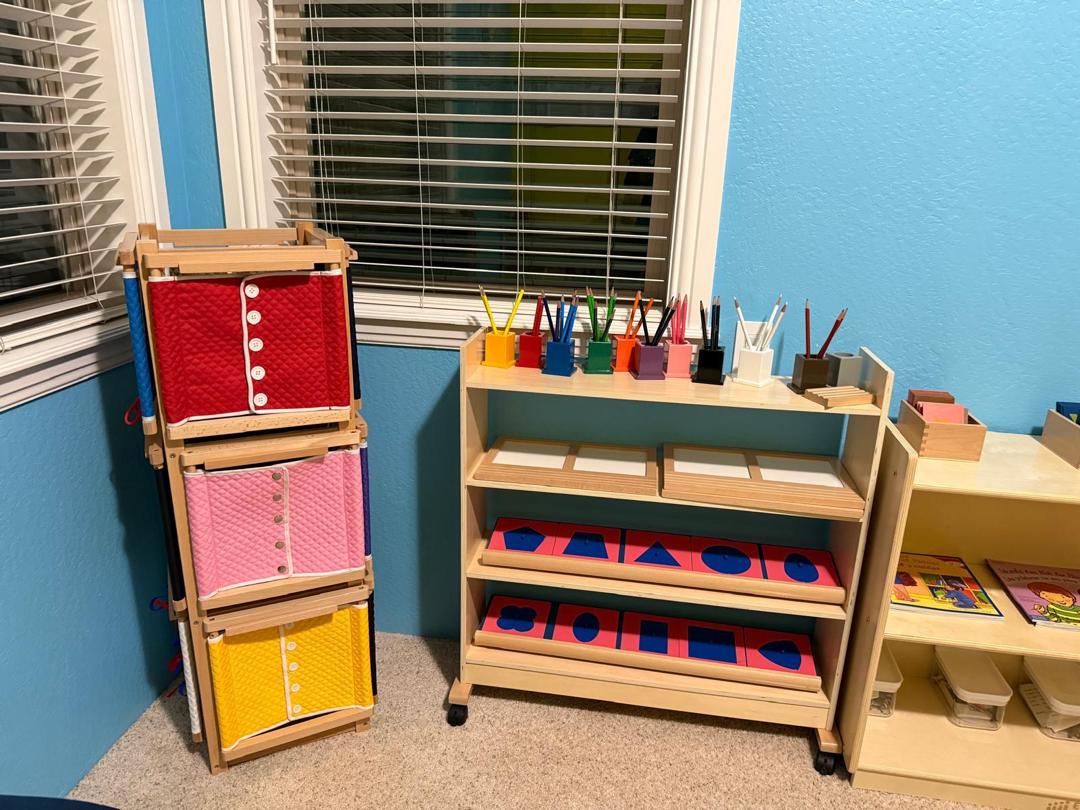
Toddler Program
Ages: 18 months - 3 years

Ages: 18 months - 3 years

The toddler years are a period of remarkable growth and discovery. Between 18 months and 3 years, children are developing their sense of self, asserting independence, and building the foundation for all future learning. Our Montessori Toddler Program is specially designed to support this critical developmental period with patience, respect, and understanding.
Toddlers are driven by a powerful urge to do things independently - "Me do it!" becomes their mantra. Rather than viewing this as challenging behavior, we recognize it as a natural and essential part of development. Our program channels this energy into purposeful activities that build real competence and confidence.
With a 6:1 toddler-to-teacher ratio, our certified Montessori educators provide individualized support while fostering growing independence. The prepared environment is carefully designed for toddler-sized hands and developing abilities, with everything placed at their level to encourage self-directed learning and exploration.
Our toddler classroom balances freedom with clearly defined limits. Children have the freedom to choose their work, move about the environment, and work at their own pace. Within this freedom, they learn to respect classroom rules, care for materials, and consider the needs of others. This balance teaches self-regulation, decision-making, and social awareness.
The environment is organized into distinct areas for different types of activities: practical life, sensorial exploration, language development, and movement. Materials are presented on low, accessible shelves, inviting exploration while maintaining order and predictability that toddlers need to feel secure.
Our daily schedule provides structure while remaining flexible to meet individual needs.
Children arrive and are greeted warmly. They hang up their belongings, wash hands, and transition into the classroom. Early arrivers enjoy quiet activities and breakfast if desired.
Uninterrupted work time where children freely choose activities. Teachers give individual and small group lessons. Snack is available throughout the morning - children prepare, serve themselves, and clean up independently.
Circle time with songs, movement activities, and simple group lessons. Stories, fingerplays, and musical instruments. Grace and courtesy lessons for the whole community.
Outdoor exploration in our toddler garden. Gross motor activities, nature observation, sensory play. Children help water plants and care for the outdoor environment.
Family-style lunch where children serve themselves with support. Conversation and social time at the table. Post-lunch toileting and diapering routine with respect for each child's readiness.
Quiet rest on individual cots with soft music and dimmed lights. Children who don't sleep engage in quiet activities after an appropriate rest period.
Shorter work period with focus on favorite activities. Afternoon snack available. Quieter, calmer activities as energy levels wind down.
Mixed-age group time with older toddlers and younger primary children. Art activities, storytelling, and free play. Children are picked up with warm farewells and daily updates shared with families.
Care of Self: Handwashing, dressing frames (buttons, zippers, snaps), food preparation, pouring, spooning
Care of Environment: Sweeping, dusting, watering plants, washing tables, folding cloths
Grace and Courtesy: Greeting others, saying please and thank you, waiting turns, conflict resolution
These activities develop concentration, coordination, independence, and order.
Visual Discrimination: Knobbed cylinders, color tablets, geometric solids, puzzle maps
Tactile Development: Touch boards, fabrics, texture matching, thermic tablets
Other Senses: Sound cylinders, smelling bottles, tasting activities
Sensorial materials refine perception and develop discrimination skills.
Oral Language: Conversation, vocabulary enrichment, nomenclature cards, language baskets
Pre-Reading: Books with realistic images, story time, picture matching
Pre-Writing: Activities that strengthen hand muscles, finger painting, coloring
Rich language experiences build vocabulary and communication skills.
Early Math Concepts: Counting activities, quantity recognition, one-to-one correspondence
Sorting and Matching: Grouping objects by attributes, pattern recognition
Sequencing: Size ordering, seriation activities
Concrete materials make abstract mathematical concepts tangible.
Geography: Land and water forms, puzzle maps, cultural baskets from different countries
Science: Nature observation, living vs. non-living, animal and plant studies
Art: Various media for creative expression, exploring colors and textures
Music: Instruments, singing, movement to music, listening activities
Everything in our toddler environment is designed to support independence. Child-sized sinks, low mirrors, accessible shelves, and appropriately weighted materials allow toddlers to care for themselves and their environment without adult assistance.
We teach toddlers to:
These practical life skills build self-confidence, concentration, and a sense of capability that extends far beyond the classroom.
We support families through the toilet learning process with patience and respect for each child's individual timeline. Our approach is based on Montessori principles and current best practices in child development.
Our toilet learning philosophy:
We provide regular bathroom breaks, observe for individual cues, and celebrate successes without pressure or rewards. When children are truly ready, the process is typically smooth and stress-free.

Toddlers learn to dress themselves, use the bathroom, wash hands, prepare simple snacks, and take care of their personal belongings with growing independence.
Problem-solving, concentration, memory, cause and effect understanding, categorization, and the beginning of logical thinking through hands-on experiences.
Rapid vocabulary growth, sentence formation, conversational skills, and the foundations of literacy through rich language exposure and meaningful interactions.
Sharing, taking turns, expressing emotions appropriately, empathy, conflict resolution, and developing friendships in a supportive community.
Gross motor skills through movement and outdoor play, and fine motor skills through practical life activities and manipulation of small materials.
Responsibility for materials and spaces, an understanding of order and cleanliness, and a developing sense of environmental stewardship.
By the time children transition to our Primary program around age 3, they have developed:
These foundational skills set the stage for success in the Primary classroom and beyond.
Enroll in our nurturing toddler program today